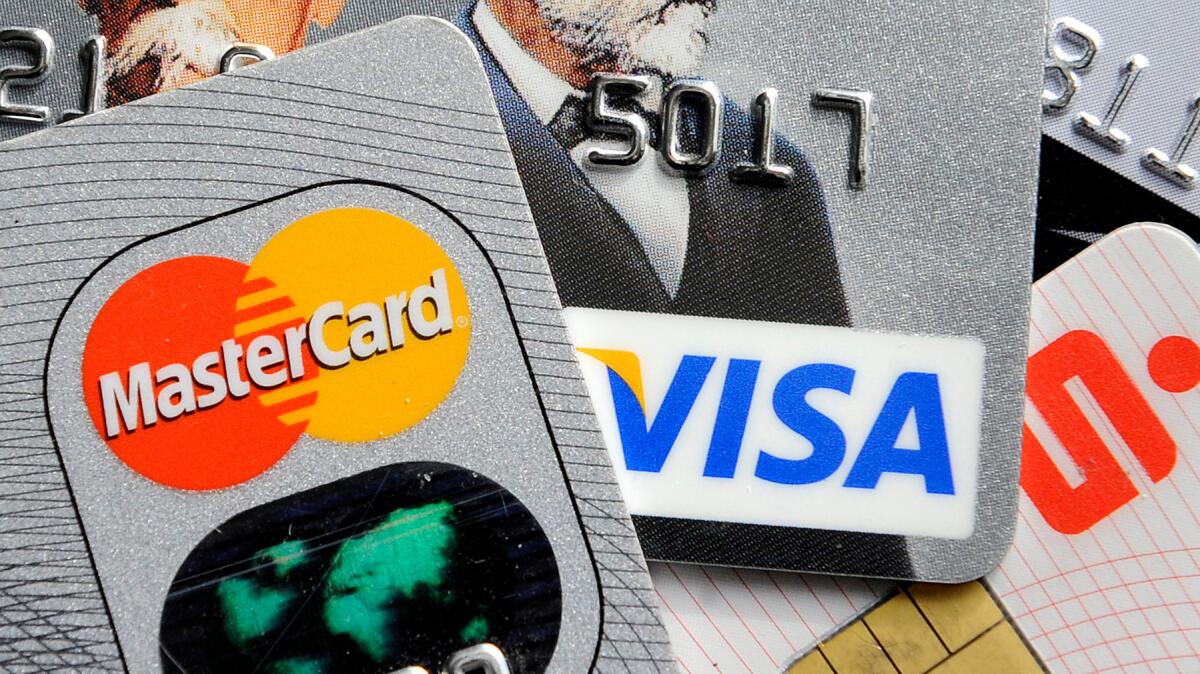Will closing high-interest cards hurt your credit score?

- Share via
Dear Liz: I have a few credit cards with very high interest rates — in the mid-teens. My FICO has improved (805 to 830) and I carry little or no balance on the credit cards. I have contacted the issuers asking for lower interest rates but they won’t budge. I have other credit cards with single-digit interest rates. I would like to close the credit cards with the higher interest rates and understand that I may see a drop in my FICO score. How long will take to get my credit score back in the 800s? Is this a wise move?
Answer: Sites that offer credit scores often also have simulators that estimate what might happen if you take certain actions, such as closing cards. You’ll note, though, that these simulators come with plenty of caveats that add up to: Your mileage may vary. A lot.
The reality is that it’s often tough to predict exactly how account closures will affect your scores or precisely how long those scores will take to recover. That doesn’t mean you can never close a card. For example, if you’re not using the card and you’re tired of paying an annual fee, then closing it can make sense if your scores are good and you’re not going to be in the market for a major loan, such as a mortgage. (You don’t want to close or open other accounts while you’re in the process of getting a loan.) If your scores drop a bit, it won’t be a crisis.
Closing a bunch of accounts at once, however, is generally not a good idea — particularly if you’re just doing it to “show them who’s boss.” If you’re not paying interest on these cards, their rates are irrelevant.
Options for a pension payout
Dear Liz: I am a single, 52-year-old female. I just received some information about my pension from a previous employer that gives me the option to take a lump sum of $18,701 that I can roll it into an eligible retirement plan. Or I could also take it now and be subject to penalty and taxes. Or I could defer taking payment until I’m 65, when I would start getting a monthly estimated check worth $218.68. The time is limited to make my decision. I don’t need income now, so I am interested in taking the rollover and severing ties with them. But I could wait until I am 65 and take the monthly payments. Which deal is better financially?
Answer: Theoretically you can do better with the lump sum — assuming you roll it over into an IRA or other retirement plan, invest at least half of it in stocks for long-term growth and keep your hands off the money until you’re ready to retire. If you would be tempted to do something stupid like cash out, then you’re better off with the annuity. The annuity check also is for life, while the fate of the lump sum depends on market returns.
What happens to debts after death?
Dear Liz: When a person passes away, what happens to their debt obligations? A brother has been diagnosed with terminal cancer, and my husband is listed as the beneficiary. His residence is paid off but has monthly homeowners association fees and property taxes that we would expect to pay. However, he has had low income for years, so he also has substantial credit-card debt, a line of credit with a large outstanding balance and some other debts. He refuses to share pertinent details (such as account numbers) so that we can address these issues when he dies. It’s clear that he will not be able to address them. Any advice?
Answer: Your brother-in-law’s creditors typically will file claims against his estate after he dies. Those bills are paid before what’s left, if anything, can be distributed to his heirs. If his home equity and other assets aren’t sufficient to pay his debts, however, those heirs won’t be on the hook. The creditors will take what they can get and write off the unpaid balance.
You say your husband is “listed” as the beneficiary, but you don’t say where. If his brother doesn’t have a will or living trust, he should be encouraged to visit an estate-planning attorney as soon as possible. He should also have powers of attorney drafted that name the people he wants to make healthcare and financial decisions for him should he become incapacitated.
In the meantime, stop bugging the poor man for his account numbers. There’s no need for you to have that information while he’s still alive and able to handle his own affairs.
Liz Weston, certified financial planner, is a personal finance columnist for NerdWallet. Questions may be sent to her at 3940 Laurel Canyon, No. 238, Studio City, CA 91604, or by using the “Contact” form at asklizweston.com. Distributed by No More Red Inc.
Si desea leer la nota en inglés, haga clic aquí.
More to Read
Inside the business of entertainment
The Wide Shot brings you news, analysis and insights on everything from streaming wars to production — and what it all means for the future.
You may occasionally receive promotional content from the Los Angeles Times.










